NAGRA Manj, Appellant - Immigration Advisers Authority
NAGRA Manj, Appellant - Immigration Advisers Authority
NAGRA Manj, Appellant - Immigration Advisers Authority
Create successful ePaper yourself
Turn your PDF publications into a flip-book with our unique Google optimized e-Paper software.
[11] No immigration advice may be given by any person unless registered underthe Act or exempted by its provisions. ―<strong>Immigration</strong> advice‖ is defined in s 7 of theAct and:(a)Means using, or purporting to use knowledge of or experiencein immigration to advise, direct, assist, or represent anotherperson in regard to an immigration matter relating to NewZealand, whether directly or indirectly and whether or not forgain or reward; but(b) does not include –(i) providing information that is publicly available, or that isprepared or made available by the Department; or(ii) directing a person to the Minister or the Department, or to animmigration officer, a visa officer, or a refugee status officer(within the meaning of the <strong>Immigration</strong> Act 1987), or to a listof licensed immigration advisers; or(iii) carrying out clerical work, translation or interpreting services,or settlement services.[12] In addition s 9 provides that there shall be no acceptance of immigrationapplications or requests from unlicensed immigration advisers.[13] The crux of this appeal concerns the relationship between and application ofss 10, 15, 16 and 17 of the Act. These are set out as follows:10 Who may be licensed as immigration adviserA person may be licensed as an immigration adviser only if—(a) the person is a natural person who applies for a licence under section 18;and(b)(c)(d)the Registrar is satisfied that the person meets the competency standardsset under section 36; andthe person is not prohibited from holding a licence under section 15, and,in the case of a person to whom section 16 or 17 applies, is determinedby the Registrar to be a fit and appropriate person to hold a licence; andthe person is not a category 2 exemptee or a lawyer.
(c)a person to whom section 15(1)(a) or (b) has applied in the past.17 Other matters relevant to fitness for licensingIn determining a person's fitness to be licensed, the Registrar may take intoaccount—(a)(b)(c)any conviction, whether in New Zealand or in another country, for anoffence of a kind other than those referred to in sections 15 and 16:any disciplinary proceedings, whether in New Zealand or in anothercountry, and whether in relation to the provision of immigration adviceor in relation to the conduct of any other occupation or profession, takenor being taken against the person (including any past cancellation orsuspension of a licence under this Act, or any non-compliance with anyother sanction imposed under this Act):whether or not the person is related by employment or association to aperson to whom a licence would be refused under this section or section15 or 16.[14] While I have set out the provisions of s 17 I perceive that it really had norelevance to the Registrar’s direction in this case. The Registrar neverthelessreferred to it in his decision as having relevance to any decision under S 19 to grant alicence should he have done so. In any event none of the circumstances specified ins 17 exist in this case.FACTUAL HISTORY - CONVICTIONS[15] Mr Nagra was convicted in the Hamilton High Court following guiltyverdicts by a jury in respect of three charges of dishonesty offending. The offenceswere theft of a motor vehicle, theft by failing to account and theft by a person in aspecial relationship. Two of the offences were committed in 2001 and the third in2003. Mr Nagra was at that time employed as an immigration officer by theNew Zealand <strong>Immigration</strong> Service division of the Department of Labour. He thenwent under the name <strong>Manj</strong>it Singh. On 30 September 2005, following the verdicts,he was sentenced by Justice Venning, the trial judge, to 300 hours of communitywork on each charge to be served concurrently.
[16] Justice Venning, in the High Court, upon sentencing Mr Nagra, set out thefactual position relating to the offending as follows:―[2] At the time of your offending you were employed as an immigrationofficer. Your offending arose out of that employment. Your duties as animmigration officer included the location and removal of people who wereillegally in New Zealand. You had authority under the <strong>Immigration</strong> Act1987 to seize money and property from such people for the purposes ofrecovering the costs associated with their deportation.[3] In July 2001 you located and had the police take into custody anArisa Lerdchanchi. She owned a motor vehicle valued at $500. The Crownevidence against you that the jury accept was that you sold the vehicle toMr Changratlanachaichok for $500. You made no record of that transactionand you did not account for the $500 you received. You were found guiltyon one count of theft of the vehicle and also the count of failing to account inrelation to that transaction.[4] Approximately two years later, in October 2003, you located fourpeople in Gisborne who were illegally in New Zealand. One of them owneda motor vehicle. You allowed or directed a friend of the overstayers to sellthat motor vehicle. She sold the car and gave you the net proceeds as yourequired. The net proceeds were $1900. Again you failed to account for that$1900. In total then you received $2,400 that you were obliged to account toyour employer, the <strong>Immigration</strong> Service, for and you failed to account.[5] Your offending has affected the <strong>Immigration</strong> Service as has beenreferred to in submissions. In a letter to the Court the Deputy Secretary ofWorkforce of the Department of Labour records that and notes particularlythat your conduct and the prosecution and publicity associated with it haveimpacted on employees throughout the Department. It has called intoquestion other employees’ integrity, particularly those who exercise thesame powers as you did, Compliance Officers.[ 17] Justice Venning in his sentencing went on to say:―For my part I do not accept that your offending is analogous in nature to asolicitor’s breach of trust but rather I see your offending, while clearly abreach of trust, as more in the nature of an employee failing to account to anemployer for the funds. While you were convicted of one charge of theft inrelation to a third party’s car, in my view given that you were authorised tosell the cars, the principal offending in your case was your failure to accountfor the proceeds of sale to the <strong>Immigration</strong> Service as you should have. Youfailed to account to your employer with the consequences that you are nowwell aware of. Following conviction you have accepted your conviction,you have accepted the verdict of the jury and you have now provided fulland complete reparation. In fact it seems you have overpaid by $300.‖[18] At the hearing of this appeal, the respondent raised an issue as to whether,indeed, Mr Nagra even had authority under the <strong>Immigration</strong> Act to seize money andproperty for the purposes of recovering the costs associated with the deportation.
That is the point I reserved for further submissions. In the memorandum nowreceived from counsel, the respondent is satisfied, on the basis of the evidencereceived at the trial that the appellant legitimately believed he had authority to upliftand sell the motor vehicles of those who had been detained pending deportation.Although it was the appellant’s case that he did not sell the vehicle, he was entitledto do so. Accordingly, the respondent no longer wishes to pursue the issue ofwhether the appellant did have statutory authority to retain the vehicle, the subject ofthe charges. It has been agreed between counsel that the appeal can be finalised onthe basis of Justice Venning’s sentencing remarks, including his observation thatMr Nagra (Singh) had authority to seize money and property for the purposes ofrecovering deportation costs.THE REGISTRAR’S DECISION[19] Having referred to the relevant provisions of the Act and his perception oftheir input and meaning, the Registrar indicated that:―I am not satisfied that the applicant is fit to be licensed as an <strong>Immigration</strong>Adviser, having regard to the matter specified in s 16 of the <strong>Immigration</strong><strong>Advisers</strong> Licensing Act 2007.‖The inquiry, the subject of this appeal, relates solely to the Registrar’s application ofs 16 of the Act in declining a licence. It does not relate to any issue of competency.[20] At two places in the decision the Registrar indicates that s 16 of the Actestablishes a presumption against licensing for the categories of persons identified.Mr Gorringe, in his submissions, argued that that was not a correct statement of thelegal position. Ms Thomson, on the other hand, on behalf of the respondentsubmitted that the form of the wording in the section meant that there was apresumption. Mr Gorringe’s submission was that if there was a presumption thenthere could be inferred a correlative burden on the applicant to displace it when nosuch burden exists under the wording. While I agree there is no burden or onus uponan applicant, I am of the view that the use of the words ―must not be licensed unless‖used in s 16 does infer a presumption against registration where the person applyinghas a conviction of the kind specified in s 16(a). Similar wording to this, forinstance, is adopted in s 128(B) of the Crimes Act 1961 which reads:
none of the references and letters of support addressed whether Mr Nagra was fit tobe licensed. Finally, in this decision he states:―Section 16 establishes a presumption against licensing. Given the breach oftrust characterising Mr Nagra’s offences and the fact that his most recentoffending occurred six years ago, I am not satisfied that the nature ofMr Nagra’s offending is unlikely to adversely affect the persons fitness toprovide immigration. [sic]‖[24] Ms Thomson for the Registrar, conceded in oral submissions that inexercising his discretion, the Registrar had not provided in the decision anappropriate linkage between the facts to be considered and his conclusion as tofitness. In other words, the Registrar having considered the nature of the offending,has not stated exactly why he is not satisfied the convictions and the nature of themis unlikely to adversely affect Mr Nagra’s fitness to provide immigration advice.FINDINGS[25] I agree with Ms Thomson’s submission that s 16 of the Act sets the bar onlicensing reasonably high. The use of the words ―is unlikely to adversely affect theperson’s fitness to provide immigration advice‖ means that when the Registrar isconsidering them within the context of the nature of the relevant offence and itseffect, the standard he is to apply is a high one. That is because the discretion isbeing exercised on the basis of mere likelihood.[26] Having regard to the purposes of the Act, strongly consumer oriented, theeffect of s 16 is to provide a very limited exception to prohibition when specifiedcrimes, offences or restrictions have been previously committed or imposed. Whens 16 is read in the context of the surrounding provisions, concentration must bedirected to the exact nature of the relevant offence and not post offending mitigatingbehaviour, as Mr Gorringe has submitted. Clearly, the ―nature‖ of the relevantoffence must include the circumstances of it otherwise there would be no need forthe Registrar to take into account degrees of seriousness of offending in each caseand his discretion would be rendered somewhat nugatory. However, that does notmean that the Registrar is required to extend his enquiries into post offendingconduct. In that regard, I accept Ms Thomson’s submission that s 16 requires an
assessment of and concentration on the nature of the offence when committed andnot the offender’s wider personal circumstances or behaviour.[27] When one reads the parliamentary debates surrounding the passage of the billsubsequently enacted, it is clear that the legislation is directed at the unscrupulousway in which some advisers were dealing with consumers seeking immigrationstatus when they were in a particularly vulnerable state. In introducing the bill to theHouse, Hon. David Cunliffe (then Minister of <strong>Immigration</strong>) explained that:… there are currently insufficient regulatory constraints or market incentivesto prevent some <strong>Advisers</strong> in providing unethical or incompetent services.… By raising the standard of immigration advice, this bill will promote andprotect the interests of migrants and potential migrants who receiveimmigration advice, and enhance the reputation of New Zealand as amigration destination.[28] Darien Fenton (Labour MP) expressed a similar sentiment during the secondreading debate as follows:The fact is that it has just been too easy for people to set themselves up asimmigration experts, to take money from unsuspecting people, to give theminappropriate advice, and in some cases to abscond with people’s money,leaving ruined lives behind them. In other cases, inexperience orincompetence from well-meaning people has led to cases being mishandledand it has caused an overload of a system that actually works very well.[29] Other members of the House expressed similar sentiments although in somecases in more colourful language.Clearly issues of integrity and honesty areimportant where licensed <strong>Advisers</strong> may be holding reasonably large sums of moneyon behalf of migrants or potential migrants and in particular retainers against fees tobe incurred for the future provision of advice and services.[30] As indicated, the Registrar has failed to provide a connection between thenature of the offending and his decision that Mr Nagra is not fit to provideimmigration advice. He has mainly concentrated in the decision on the issue ofwhether Mr Nagra’s offending resulted from a breach of trust. I am not satisfiedthat, in the context of the purposes of this Act, that is necessarily the primaryconsideration. Justice Venning’s consideration that there was a failure to accounthas more direct relevance to the consumer protection directions of the Act.
Obviously, not every crime of dishonesty is going to result, by its inherent nature, inprohibition from licensing. There will be degrees of offending to be taken intoaccount as well as degrees of criminality and culpability involving the same crime.For instance, one or two crimes of petty shoplifting of an historic nature would notentitle the Registrar to solely make a connection of that with matters in his discretionand then to prohibit licensing unless it was accompanied by other matters affectingfitness (s17) or competence (ss 20 and 36). Consistent periodic and recidivistoffending of that nature would, however, so seriously call into question theapplicant’s basic integrity that such a connection could then be made. Persistentoffending with dishonest use of documents could for similar reasons provide aproper basis for refusal to licence so long as the decision was reasoned. Obviously,each application must be considered on its own facts. Theft by failure to account, itseems to me, by its very nature is closely linked to the purposes of the Act. That isso, when one considers exactly what mischief the Act is designed to protect against.As the parliamentary debates disclose, this Act has been promulgated against historywithin this industry of significant sums of money being procured from prospectiveimmigrants by unscrupulous advisers who failed to provide any reasonable service inreturn or simply misappropriated the funds to their own use without any attempt toprovide a service.[31] The Registrar’s decision therefore needs to be considered against thatbackground. The present appeal involves an applicant for registration who hasoffended as an <strong>Immigration</strong> Compliance Officer in the very industry in which hisregistration would operate. The offending was serious, mainly because it involvedgrave dishonesty when acting on behalf of the State against persons who werevulnerable and defenceless. The appellant, having obtained property and moneyfrom such persons, then retained the benefit of that to himself and failed to account.That would not auger well in the mind of the Registrar who has to decide on whethersuch offending was unlikely to affect the fitness of a person to act as an immigrationadviser.[32] Mr Gorringe, in his concluding submissions, was correct in stating that theRegistrar has not accurately recorded his decision nor properly addressed the realissues set out in s 16 and accordingly, there was an error of law. Similarly, he
submitted that the Registrar placed too much weight on the breach of trust element ofthe offending, particularly when contrasted with the trial sentencing judge’s view.However, in respect of that particular submission, if the Registrar had placed weighton that aspect of the sentencing, which covered failure to account and related that tothe purposes of the Act, then he would certainly have been on strong ground.Mr Gorringe’s submissions relating to Mr Nagra’s behaviour before and after theoffences have introduced matters that do not fit within the discretion. Section 16requires the Registrar to concentrate on the nature of the relevant offence and howthat would impact on the fitness of the applicant against the stated purposes of thelegislation and having regard to the mischief, which the legislation is designed toprevent. To allow the Registrar to consider the matters which Mr Gorringe hassubmitted should be taken into account, would be to widen s 16 and lower thethreshold too far beyond its context within the surrounding provisions and statedobjects of the Act. A crime involving dishonesty and its effect on fitness also needsto be considered in its context in s 16 with the other offences specified in subsection(a) and also the offences and restrictions on status specified in subsection (b) ands 15. Even an offence against the Fair Trading Act 1986 leads to prohibition if theRegistrar exercises the discretion accordingly. The inclusion of offending andrestrictions on status of that kind specifically sets the context as one of stringentconsumer protection.[33] In conclusion, therefore, s 16 is to be narrowly construed. Concentration is tobe centred by the Registrar in the exercise of the discretion on the exact nature of theoffending and should not take account of what might be regarded as ancillarymitigatory circumstances such as post offending conduct. Where a person who hasoffended by way of failure to account on two separate occasions and been convictedon three separate crimes in respect of that offending and the offending has occurredby an officer of the State dealing with potential immigrants, the Registrar is entitledto find that such offending is relevant to that person’s fitness to provide immigrationadvice. The Registrar, in such circumstances obviously has to have regard to thepurposes of the legislation, the context in which it has been enacted and the mischiefit seeks to eliminate. It may well be that Mr Nagra has mended his ways since 2003but one of the consequences of his offending, which he now has to accept, is that
ecause of the way that his offending is categorised in the Act, he is unable to returnto the industry as an immigration adviser.[34] Section 84 provides that in determining an appeal of this kind, the Court mayconfirm, vary or reverse the decision of the Registrar. These would appear to besimilar powers to the powers prescribed under rule 561 of the now repealed DistrictCourt Rules 1992. In this case, while there may be some deficiency in the reasonsprovided by the Registrar his decision was, in the circumstances, neverthelesscorrect. For that reason the appeal is dismissed.[35] Counsel did not address me at the hearing on the issue of costs. If costs areto be sought by the respondent, written submissions are to be filed within 21 days.Mr Gorringe, on behalf of the appellant, may then have a further 14 days to file anyanswer. Any reply can then be filed within a further seven days after that.Dated at …………..this…………..day of…………2010 at……….am/pmM E PerkinsDistrict Court Judge



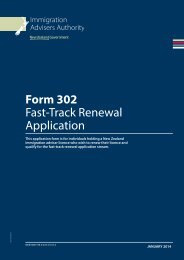
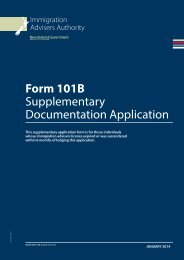
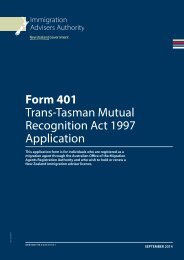
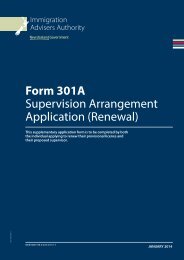
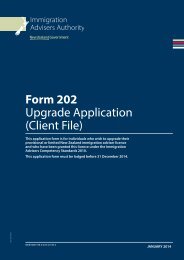
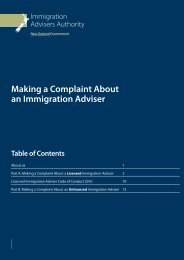
![NAGRA, Manj [pdf, 15 pages, 482KB] - Immigration Advisers Authority](https://img.yumpu.com/7242094/1/184x260/nagra-manj-pdf-15-pages-482kb-immigration-advisers-authority.jpg?quality=85)